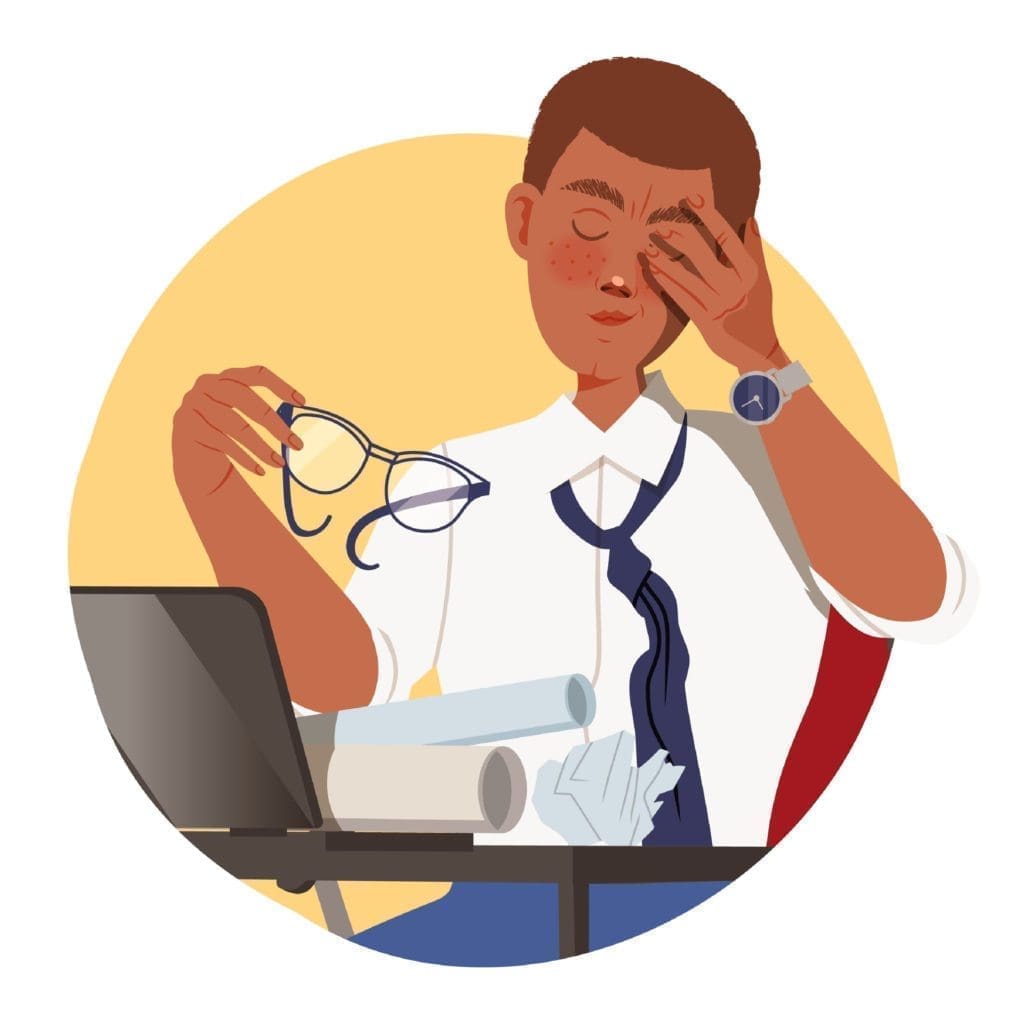Workplace Eye Health

March is Workplace Eye Wellness Month, so “Eye’d” (HA!) like to talk with you about eye care. Due to the time spent in front of computer screens and the risk of injuries from hazards such as machinery or chemicals, it’s important to pay attention to workplace eye health.
Workplace Computer Use
“Eye’m” (HA!) on my phone and computer all day, responding to questions about benefits – and it makes my eyes very dry. Does that happen to you? Computer Vision Syndrome (CVS), or digital eye strain, comes from spending too much time looking at computers, televisions, tablets, cell phones, and other screens for too many hours each day. In addition to dry eyes, CVS symptoms include eyestrain, headaches, and blurred vision. Visit an eye doctor if your eyes bother you at the end of a long, digital day. Once diagnosed, you may need eyeglasses, contacts, or vision therapy.
The good news is that there are ways to reduce symptoms before they worsen. The American Optometric Association (AOA) shares these recommendations about computer position and lighting:
- Set your monitor or screen about 4-5 inches below eye level
- Use a document holder for reference materials
- Avoid glare-inducing lights
- Make sure your chair height is correct (feet resting comfortably on the floor)
- Take rest breaks
- Remember to blink!
Workplace Eye Safety
Did you know that an average of 2,000 workplace eye injuries daily require medical treatment? Nine out of 10 workplace eye injuries could be less severe or avoided with proper eye protection. Workplace eye injuries include chemical splashes, foreign objects in the eye, scratches on the cornea, burns, and transmission of infectious diseases. They are most likely to occur when the worker is either not wearing eye protection or, at the least, not wearing the proper eye protection for risks they are exposed to.
The AOA suggests the following to protect your eyes in the workplace:
- Goggles – when working around chemicals
- Safety glasses – when working around flying objects, particles, or dust
- Face shields – when working near hazardous radiation like welding, lasers, or fiber optics
- Full-face respirators – when working around chemicals, heat, or blood-born pathogens
Employees at the highest risk of eye injury work in the following industries:
- Construction
- Manufacturing
- Mining
- Carpentry
- Auto repair
- Electrical work
- Plumbing
- Welding
- Maintenance
Treatment for Eye Injuries
According to the AOA, treatment for eye injuries varies based on the cause.
Chemical Injuries
If a chemical enters your eye, immediately remove any contact lenses. Then, flush the eye with plain water for 15 minutes. Avoid flushing with other substances you think may neutralize the chemical. Leave the eye unbandaged and seek immediate medical attention.
Particles in the eye
First and foremost, don’t rub the eye. Let natural tears wash the particle out, or irrigate with artificial tears. If needed, lift the upper eyelid outward and down over the lower lid to remove the particle. If that doesn’t work, close the eye, bandage it, and seek medical care.
Blows to the eye
If something hits your eye, gently apply a cold compress to reduce pain and swelling, but avoid putting any pressure on it. Seek medical attention.
Cuts and punctures to the eye or lid
Do not wash the eye or attempt to remove the item. Instead, cover the eye with a rigid eye shield (or if not available, then something like the bottom half of a paper cup) and seek immediate medical care.
Can I use my benefits accounts for eye health?
Eye’m glad you asked because you sure can! If you have a Flexible Spending Account (FSA), Limited Purpose FSA (LPFSA), or Health Savings Account (HSA), most vision care costs qualify for reimbursement. Eligible expenses include eye exams, corrective devices (eyeglasses, contacts, and prescription sunglasses), contact lens solutions, and other non-cosmetic eye treatments.
My good friends at FSAStore.com share some other eligible items, including protective safety glasses, multi-purpose eye solutions for chemical burns and other caustic substances, and eye cups for washing out debris,
“Eye” hope you’ve learned something about eye health in the workplace and how your benefit accounts can help keep your eyes looking, feeling, and working their best!
